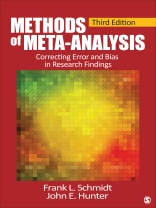Designed to provide researchers clear and informative insight into techniques of meta-analysis, the
Third Edition of
Methods of Meta-Analysis: Correcting Error and Bias in Research Findings is the most comprehensive text on meta-analysis available today. It is the only book that presents a full and usable treatment of the role of study artifacts in distorting study results, as well as methods for correcting results for such biases and errors.
Meta-analysis is arguably the most important methodological innovation in the last thirty-five years, due to its immense impact on the development of cumulative knowledge and professional practice. This text, now in its updated
Third Edition, has been revised to cover the newest developments in meta-analysis methods, evaluation, correction, and more. This reader-friendly book is the definitive resource on meta-analysis.
表中的内容
PART I: INTRODUCTION TO META-ANALYSIS
1. Integrating Research Finding Across Studies
2. Study Artifacts and Their Impact on Study Outcomes
PART II: META-ANALYSIS OF CORRELATIONS
3. Meta-Analysis of Correlations Corrected Individually for Artifacts
4. Meta-Analysis of Correlations Using Artifact Distributions
5. Technical Questions In Meta-Analysis of Correlations
PART III: META-ANALYSIS OF EXPERIMENTAL EFFECTS AND OTHER DICHOTOMOUS COMPARISONS
6. Treatment Effects: Experimental Artifacts and Their Impact
7. Meta-Analysis Methods for d Values
8. Technical Questions in Meta-Analysis of d Values
PART IV: GENERAL ISSUES IN META-ANALYSIS
9. General Technical Issues in Meta-Analysis
10. Cumulation of Findings Within Studies
11. Different Meta-Analysis Methods and Related Software
12. Locating, Evaluating, Selecting, and Coding Studies and Presentation of Meta-Analysis Results
13. Availability Bias, Source Bias, and Publication Bias in Meta-Analysis
14. Summary of Psychometric Meta-Analysis
关于作者
John E. (Jack) Hunter (1939–2002) was a professor in the Department of Psychology at Michigan State University. He received his Ph.D. in quantitative psychology from the University of Illinois. Jack coauthored four books and authored or coauthored over 200 articles and book chapters on a wide variety of methodological topics, including confirmatory and exploratory factor analysis, measurement theory and methods, statistics, and research methods. He also published numerous research articles on such substantive topics as intelligence, attitude change, the relationship between attitudes and behavior, validity generalization, differential validity/selection fairness, and selection utility. Much of his research on attitudes was in the field of communications, and the American Communications Association named a research award in his honor. Professor Hunter received the Distinguished Scientific Award for Contributions to Applied Psychology from the American Psychological Association (APA) (jointly with Frank Schmidt) and the Distinguished Scientific Contributions Award from the Society for Industrial/Organizational Psychology (SIOP) (also jointly with Frank Schmidt). He was a Fellow of APA, APS, and SIOP, and was a past president of the Midwestern Society for Multivariate Experimental Psychology. For the story of Jack’s life, see Schmidt (2003).












